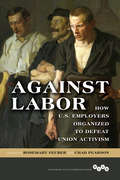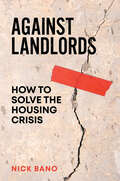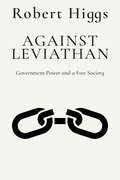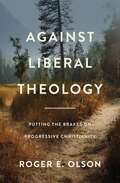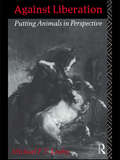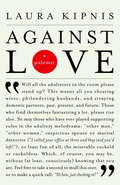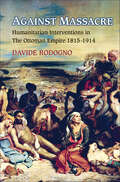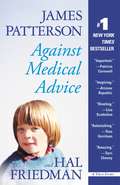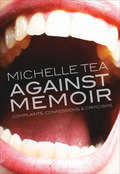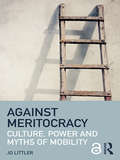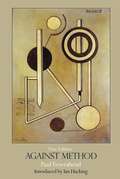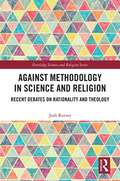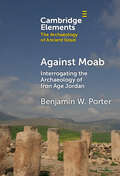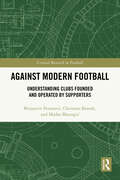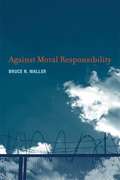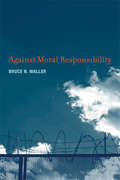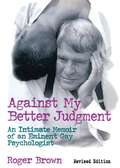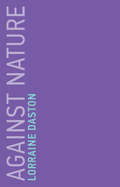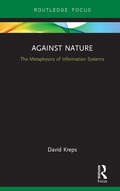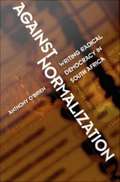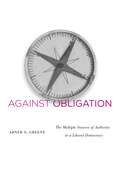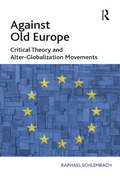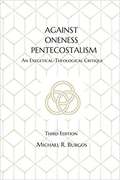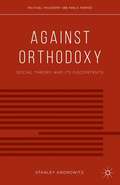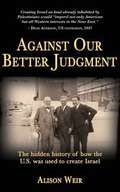- Table View
- List View
Against Labor: How U.S. Employers Organized to Defeat Union Activism
by Chad Pearson Rosemary FeurerAgainst Labor highlights the tenacious efforts by employers to organize themselves as a class to contest labor. Ranging across a spectrum of understudied issues, essayists explore employer anti-labor strategies and offer incisive portraits of people and organizations that aggressively opposed unions. Other contributors examine the anti-labor movement against a backdrop of larger forces, such as the intersection of race and ethnicity with anti-labor activity, and anti-unionism in the context of neoliberalism. Timely and revealing, Against Labor deepens our understanding of management history and employer activism and their metamorphic effects on workplace and society. Contributors: Michael Dennis, Elizabeth Esch, Rosemary Feurer, Dolores E. Janiewski, Thomas A. Klug, Chad Pearson, Peter Rachleff, David Roediger, Howard Stanger, and Robert Woodrum.
Against Landlords: How to Solve the Housing Crisis
by Nick BanoWhen landlords always win and renters pay the price, what can be done?Housing means prosperity and security for some; poverty, precarity and sickness for others. More people live in private rented accommodation than ever before, and rents rise without apparent reason. Homes are smaller every year, and nearly 20 per cent of tenants live in hazardous conditions. Homelessness is at a new high. Yet the government&’s only solution is to promote homeownership.Against Landlords shows that this crisis is not the product of happenstance or political incompetence. Government policy has intentionally split British citizens into homeowners and renters, two classes set on very different financial paths. In the UK, one out of every twenty-one adults is a landlord, and it is this group, and those who aspire to join it, represented by the political class.In his radical new interpretation of the housing crisis, lawyer Nick Bano explains how this environment set the conditions for the Grenfell Tower fire and how it means a life of anxiety for the nation&’s renters. It is a problem that stretches far beyond London and one inherently racist in nature.Building more housing is not the solution. It is firstly a problem of the law, Bano argues, and reforms must sweep away the landlordism at the heart of the housing crisis and British political life.
Against Leviathan: Government Power and a Free Society
by Robert HiggsWhat is fundamentally wrong with government today? In Against Leviathan, economist and historian Robert Higgs, offers an unflinching critical analysis of government power.Against Leviathan combines an economist&’s analytical scrutiny, an historian&’s respect for the facts, and a refusal to accept the standard excuses and cruelties of government officialdom. Topics include Social Security, the paternalism of the FDA, the &“War on Drugs,&” the nature of political leadership, civil liberties, the conduct of the national surveillance state, and governmental responses to a continuing stream of &“crises,&” including domestic economic busts and foreign wars both hot and cold. Against Leviathan is a thorough and penetrating critique, and a significant contribution in this current time of crisis and unchecked expansion of government power.
Against Liberal Theology: Putting the Brakes on Progressive Christianity
by Roger E. OlsonLiberal Christian theology is a big topic in today's churches and seminaries. But what does liberal theology really mean and why is it so controversial? What does it actually believe about truth, Scripture, and Jesus Christ? And where does it lead?The term "liberal theology" is often misinterpreted, confused with a set of loose ideologies within the Christian faith and sometimes rallied behind by genuine Christians who are simply concerned about modern social justice issues. It's also been wrongly leveled against churches and even entire denominations that don't adhere to the tradition of liberal theology.Against Liberal Theology, is written in a direct and conversational tone that makes sense of this theological movement by:Defining liberal theology and explaining its beliefs about central Christian doctrines.Giving its history and progression—beginning with 18th century German theologian Friedrich Schleiermacher and leading up to today.Making distinctions between liberal theology and simple moderate or progressive Christian thought, much of which is still biblically committed and doctrinally orthodox.Discussing the arguments of specific liberal theologians and what their words mean in regard to everyday Christian living and faith.Sincere and to the point, professor and theologian Roger E. Olson is not interested in grinding axes. He openly admits to frustration with fundamentalist Christianity and explains why. But he warns that true liberal theology—more concerned with making Christianity palatable to the modern mind than it is committed to biblical integrity—isn't the right alternative to the cultic tendencies of fundamentalism and has little in common with classical, biblical Christianity.Against Liberal Theology is perfect for Christians on any side of a cultural debate—for those who consider themselves progressive or conservative or something in between.It's always unpopular to be against anything. But in order for Christianity to be anything, it has to stand against some things. If Christianity is compatible with anything and everything, it is nothing.
Against Liberation: Putting Animals in Perspective
by Michael P. LeahyThe Western world is currently gripped by an obsessive concern for the rights of animals - their uses and abuses. In this book, Leahy argues that this is a movement based upon a series of fundamental misconceptions about the basic nature of animals.This is a radical philosophical questioning of prevailing views on animal rights, which credit animals with a self-consciousness like ours. Leahy's conclusions have implications for issues such as bloodsports, meat eating and fur trading.
Against Love
by Laura KipnisWho would dream of being against love? No one.Love is, as everyone knows, a mysterious and all-controlling force, with vast power over our thoughts and life decisions.But is there something a bit worrisome about all this uniformity of opinion? Is this the one subject about which no disagreement will be entertained, about which one truth alone is permissible? Consider that the most powerful organized religions produce the occasional heretic; every ideology has its apostates; even sacred cows find their butchers. Except for love. Hence the necessity for a polemic against it. A polemic is designed to be the prose equivalent of a small explosive device placed under your E-Z-Boy lounger. It won't injure you (well not severely); it's just supposed to shake things up and rattle a few convictions.From the Trade Paperback edition.tical questions about the social contract itself? What is the trade-off between personal gratification and the renunciations society demands of us? And is "working at your relationship" just another way of propping up the work ethicæas if we weren't all overworked enough as it is? If adultery is ultimately a referendum on the sustainability of monogamy, how credible is the basic premise of modern coupledom: that desire for your one and only love can and will persist through a lifetime of togetherness (despite so much evidence to the contrary)?Against Love offers no easy answers. Rather it intends to engage you in a commonsensical and brave examination of the plight of the modern personality, caught between the vicissitudes of desire and the decrees of social conformity.From the Hardcover edition.
Against Massacre: Humanitarian Interventions in The Ottoman Empire, 1815–1914 (Human Rights and Crimes Against Humanity #10)
by Davide RodognoAgainst Massacre looks at the rise of humanitarian intervention in the nineteenth century, from the fall of Napoleon to the First World War. Examining the concept from a historical perspective, Davide Rodogno explores the understudied cases of European interventions and noninterventions in the Ottoman Empire and brings a new view to this international practice for the contemporary era. While it is commonly believed that humanitarian interventions are a fairly recent development, Rodogno demonstrates that almost two centuries ago an international community, under the aegis of certain European powers, claimed a moral and political right to intervene in other states' affairs to save strangers from massacre, atrocity, or extermination. On some occasions, these powers acted to protect fellow Christians when allegedly "uncivilized" states, like the Ottoman Empire, violated a "right to life." Exploring the political, legal, and moral status, as well as European perceptions, of the Ottoman Empire, Rodogno investigates the reasons that were put forward to exclude the Ottomans from the so-called Family of Nations. He considers the claims and mixed motives of intervening states for aiding humanity, the relationship between public outcry and state action or inaction, and the bias and selectiveness of governments and campaigners. An original account of humanitarian interventions some two centuries ago, Against Massacre investigates the varied consequences of European involvement in the Ottoman Empire and the lessons that can be learned for similar actions today.
Against Medical Advice: A True Story
by James Patterson Hal FriedmanCory Friedman woke up one morning when he was five years old with the uncontrollable urge to twitch his neck. From that day forward his life became a hell of irrepressible tics and involuntary utterances, and Cory embarked on an excruciating journey from specialist to specialist to discover the cause of his disease. Soon it became unclear what tics were symptoms of his disease and what were side effects of the countless combinations of drugs. The only certainty is that it kept getting worse. Simply put: Cory Friedman's life was a living hell.AGAINST MEDICAL ADVICE is the true story of Cory and his family's decades-long battle for survival in the face of extraordinary difficulties and a maddening medical establishment. It is a heart-rending story of struggle and triumph with a climax as dramatic as any James Patterson thriller.
Against Memoir: Complaints, Confessions & Criticisms
by Michelle TeaThe PEN Award-winning essay collection about queer lives: &“Gorgeously punk-rock rebellious.&”—The A.V. Club The razor-sharp but damaged Valerie Solanas; a doomed lesbian biker gang; recovering alcoholics; and teenagers barely surviving at an ice creamery: these are some of the larger-than-life, yet all-too-human figures populating America&’s fringes. Rife with never-ending fights and failures, theirs are the stories we too often try to forget. But in the process of excavating and documenting these queer lives, Michelle Tea also reveals herself in unexpected and heartbreaking ways. Delivered with her signature honesty and dark humor, this is the first-ever collection of journalistic writing by the author of How to Grow Up and Valencia. As she blurs the line between telling other people&’s stories and her own, she turns an investigative eye to the genre that&’s nurtured her entire career—memoir—and considers the price that art demands be paid from life. &“Eclectic and wide-ranging…A palpable pain animates many of these essays, as well as a raucous joy and bright curiosity.&” —The New York Times &“Queer counterculture beats loud and proud in Tea&’s stellar collection.&” —Publishers Weekly (starred) &“The best essay collection I've read in years.&”—The New RepublicWinner of the PEN/Diamonstein-Spielvogel Award for the Art of the Essay
Against Meritocracy: Culture, power and myths of mobility
by Jo LittlerMeritocracy today involves the idea that whatever your social position at birth, society ought to offer enough opportunity and mobility for ‘talent’ to combine with ‘effort’ in order to ‘rise to the top’. This idea is one of the most prevalent social and cultural tropes of our time, as palpable in the speeches of politicians as in popular culture. In this book Jo Littler argues that meritocracy is the key cultural means of legitimation for contemporary neoliberal culture – and that whilst it promises opportunity, it in fact creates new forms of social division. Against Meritocracy is split into two parts. Part I explores the genealogies of meritocracy within social theory, political discourse and working cultures. It traces the dramatic U-turn in meritocracy’s meaning, from socialist slur to a contemporary ideal of how a society should be organised. Part II uses a series of case studies to analyse the cultural pull of popular ‘parables of progress’, from reality TV to the super-rich and celebrity CEOs, from social media controversies to the rise of the ‘mumpreneur’. Paying special attention to the role of gender, ‘race’ and class, this book provides new conceptualisations of the meaning of meritocracy in contemporary culture and society.
Against Method
by Paul FeyerabendPaul Feyerabend's globally acclaimed work, which sparked and continues to stimulate fierce debate, examines the deficiencies of many widespread ideas about scientific progress and the nature of knowledge. Feyerabend argues that scientific advances can only be understood in a historical context. He looks at the way the philosophy of science has consistently overemphasized practice over method, and considers the possibility that anarchism could replace rationalism in the theory of knowledge. This updated edition of the classic text includes a new introduction by Ian Hacking, one of the most important contemporary philosophers of science. Hacking reflects on both Feyerabend's life and personality as well as the broader significance of the book for current discussions.
Against Methodology in Science and Religion: Recent Debates on Rationality and Theology (Routledge Science and Religion Series)
by Josh ReevesSince its development as a field over the last part of the twentieth century, scholars in science and religion have been heavily concerned with methodological issues. Following the lead of Thomas Kuhn, many scholars in this interdisciplinary field have offered proposals that purport to show how theology and science are compatible by appropriating theories of scientific methodology or rationality. Arguing against this strategy, this book shows why much of this methodological work is at odds with recent developments in the history and philosophy of science and should be reconsidered. Firstly, three influential methodological proposals are critiqued: Lakatosian research programs, Alister McGrath’s "Scientific Theology" and the Postfoundationalist project of Wentzel van Huyssteen. Each of these approaches is shown to have a common failing: the idea that science has an essential nature, with features that unite "scientific" or even "rational" inquiry across time or disciplines. After outlining the issues this failing could have on the viability of the field, the book concludes by arguing that there are several ways scholarship in science and religion can move forward, even if the terms "science" and "religion" do not refer to something universally valid or philosophically useful. This is a bold study of the methodology of science and religion that pushes both subjects to consider the other more carefully. As such, it will be of great interest to scholars in religious studies, theology and the philosophy of science.
Against Moab: Interrogating the Archaeology of Iron Age Jordan (Elements in The Archaeology of Ancient Israel)
by Benjamin W. PorterKnown as a place, a people, and a kingdom at various points in the second and first millennia BCE, Moab has long sustained the attention of archaeologists, philologists, and historians, in part because of its adjacent location to ancient Israel. The past 150 years of research in what is today west-central Jordan has proffered a significant corpus of evidence from the region's archaeological sites. However, a critical analysis of this evidence reveals significant gaps in knowledge that challenge attempts to narrate Moab's political, economic, and social history. This Element examines the evidence as well as the debates surrounding Moab's development and decline. This title is also available as open access on Cambridge Core.
Against Modern Football: Understanding Clubs Founded and Operated by Supporters (Critical Research in Football)
by Christian Brandt Benjamin Perasović Marko MustapićThis is the first book to offer in-depth analysis of the "Against Modern Football" movement through the comparison of two AMF clubs. The movement has emerged in opposition to the rampant commercialisation of football and the lack of supporters’ influence over the governance of the clubs they support. Drawing on long-term ethnographic research, the book examines the foundation, organisation and governance of new clubs set up by supporters as part of the AMF movement. Centred on detailed case studies of two clubs in particular—HFC Falke in Germany, founded in 2014, and Varteks Varaždin in Croatia, founded in 2011—the book explores supporter cultures and identity and considers the social processes at work in the foundation of new football clubs. By examining the unique local and national contexts in which HFC Falke and Varteks Varaždin have emerged, as well the broader international context that encompasses well-known AMF clubs such as FC United of Manchester, the book makes an important contribution to our understanding of supporters, their activism, the significance of football clubs, and social movements more broadly. This book is fascinating reading for anybody with an interest in football, the sociology of sport, sport management, the politics of sport, social movements, subcultures, or ethnography.
Against Moral Responsibility
by Bruce N. WallerIn Against Moral Responsibility, Bruce Waller launches a spirited attack on a system that is profoundly entrenched in our society and its institutions, deeply rooted in our emotions, and vigorously defended by philosophers from ancient times to the present. Waller argues that, despite the creative defenses of it by contemporary thinkers, moral responsibility cannot survive in our naturalistic-scientific system. The scientific understanding of human behavior and the causes that shape human character, he contends, leaves no room for moral responsibility. Waller argues that moral responsibility in all its forms--including criminal justice, distributive justice, and all claims of just deserts--is fundamentally unfair and harmful and that its abolition will be liberating and beneficial. What we really want--natural human free will, moral judgments, meaningful human relationships, creative abilities--would survive and flourish without moral responsibility. In the course of his argument, Waller examines the origins of the basic belief in moral responsibility, proposes a naturalistic understanding of free will, offers a detailed argument against moral responsibility and critiques arguments in favor of it, gives a general account of what a world without moral responsibility would look like, and examines the social and psychological aspects of abolishing moral responsibility. Waller not only mounts a vigorous, and philosophically rigorous, attack on the moral responsibility system, but also celebrates the benefits that would result from its total abolition.
Against Moral Responsibility
by Bruce N. WallerA vigorous attack on moral responsibility in all its forms argues that the abolition of moral responsibility will be liberating and beneficial.In Against Moral Responsibility, Bruce Waller launches a spirited attack on a system that is profoundly entrenched in our society and its institutions, deeply rooted in our emotions, and vigorously defended by philosophers from ancient times to the present. Waller argues that, despite the creative defenses of it by contemporary thinkers, moral responsibility cannot survive in our naturalistic-scientific system. The scientific understanding of human behavior and the causes that shape human character, he contends, leaves no room for moral responsibility.Waller argues that moral responsibility in all its forms—including criminal justice, distributive justice, and all claims of just deserts—is fundamentally unfair and harmful and that its abolition will be liberating and beneficial. What we really want—natural human free will, moral judgments, meaningful human relationships, creative abilities—would survive and flourish without moral responsibility. In the course of his argument, Waller examines the origins of the basic belief in moral responsibility, proposes a naturalistic understanding of free will, offers a detailed argument against moral responsibility and critiques arguments in favor of it, gives a general account of what a world without moral responsibility would look like, and examines the social and psychological aspects of abolishing moral responsibility. Waller not only mounts a vigorous, and philosophically rigorous, attack on the moral responsibility system, but also celebrates the benefits that would result from its total abolition.
Against My Better Judgment: An Intimate Memoir of an Eminent Gay Psychologist
by Roger BrownAgainst My Better Judgment: An Intimate Memoir of an Eminent Gay Psychologist is an extraordinary and moving account of the life of a gay man in his late 60s after he loses his companion of 40 years to cancer. A leading professor of psychology at Harvard University, Roger Brown bravely comes forth with his compelling story of grief, loneliness, and a relentless search for intimacy, healing, and self-acceptance. Readers gain insight into a stage of life experienced by gay men of which little is written or spoken due to the ageism that characterizes homosexual culture. Against My Better Judgment reveals deeply personal truths that will prepare gay men for what to expect in the later stages of life. Universal in nature, these truths will speak to readers from various lifestyles and of all ages. Readers will recognize the book as a story of looking for love in all the wrong places, but will also see in it a process of discovery--both internal and external. In the aftermath of his lover&’s death, Brown turns to prostitutes for companionship, for relieving repressed sexual energy, and even for love. Through his unique relationships with three young men, he does not find the romantic love he so desperately seeks, but discovers that his idea of human nature has been formed by his particular life position and association with people who share his values, knowledge, and privileges. Once he goes outside his social and intellectual circle, he acquires a new perspective on life and realizes how far from universal truth his notions of humanity have been.Readers of Against My Better Judgment will gain a different perspective on the complexities of love, relationships, fidelity, human nature, and the hardships of life inevitably faced by all humans--straight, gay, or bisexual. Gay men, lesbians, psychologists, widowers, therapists, and anthropologists, as well as sensitive readers of any background, will heighten their understanding of what it means to be human. This remarkable story makes a tremendous contribution to existing gay literature and the timeless struggle of art and literature to make sense of the universe and the place of humans within it. Echoing life, Against My Better Judgment, with its brutal honesty, intrigues and repels alternately, just as it elicits both sadness and laughter.
Against Nature (Untimely Meditations #17)
by Lorraine DastonA pithy work of philosophical aMassachusetts Institute of Technologynthropology that explores why humans find moral orders in natural orders.Why have human beings, in many different cultures and epochs, looked to nature as a source of norms for human behavior? From ancient India and ancient Greece, medieval France and Enlightenment America, up to the latest controversies over gay marriage and cloning, natural orders have been enlisted to illustrate and buttress moral orders. Revolutionaries and reactionaries alike have appealed to nature to shore up their causes. No amount of philosophical argument or political critique deters the persistent and pervasive temptation to conflate the “is” of natural orders with the “ought” of moral orders.In this short, pithy work of philosophical anthropology, Lorraine Daston asks why we continually seek moral orders in natural orders, despite so much good counsel to the contrary. She outlines three specific forms of natural order in the Western philosophical tradition—specific natures, local natures, and universal natural laws—and describes how each of these three natural orders has been used to define and oppose a distinctive form of the unnatural. She argues that each of these forms of the unnatural triggers equally distinctive emotions: horror, terror, and wonder. Daston proposes that human reason practiced in human bodies should command the attention of philosophers, who have traditionally yearned for a transcendent reason, valid for all species, all epochs, even all planets.
Against Nature: The Metaphysics of Information Systems
by David KrepsThis book questions the nature of the business and social information systems so ubiquitous in contemporary life. Linking positivism, individualism, and market-fundamentalist economics at the root of these systems, it critiques the philosophical ground of this triumvirate as fundamentally against nature. Connecting counter-philosophies of the subject as a natural part of existence, with more collectivist and ecological economics, it presents a historical critique of the development of the academic field of information systems and offers a complex view of the nature of Nature through which we might reshape our approach to technology and to our economies to overcome the existential threat of climate change. As such, it will appeal to philosophers, social theorists, and scholars of science and technology studies with interests in the environment and ecology, as well as those working in the field of information systems.
Against Normalization: Writing Radical Democracy in South Africa
by Anthony O'BrienAt the end of apartheid, under pressure from local and transnational capital and the hegemony of Western-style parliamentary democracy, South Africans felt called upon to normalize their conceptions of economics, politics, and culture in line with these Western models. In Against Normalization, however, Anthony O'Brien examines recent South African literature and theoretical debate which take a different line, resisting this neocolonial outcome, and investigating the role of culture in the formation of a more radically democratic society. O'Brien brings together an unusual array of contemporary South African writing: cultural theory and debate, worker poetry, black and white feminist writing, Black Consciousness drama, the letters of exiled writers, and postapartheid fiction and film. Paying subtle attention to well-known figures like Nadine Gordimer, Bessie Head, and Njabulo Ndebele, but also foregrounding less-studied writers like Ingrid de Kok, Nise Malange, Maishe Maponya, and the Zimbabwean Dambudzo Marechera, he reveals in their work the construction of a political aesthetic more radically democratic than the current normalization of nationalism, ballot-box democracy, and liberal humanism in culture could imagine. Juxtaposing his readings of these writers with the theoretical traditions of postcolonial thinkers about race, gender, and nation like Paul Gilroy, bell hooks, and Gayatri Spivak, and with others such as Samuel Beckett and Vaclav Havel, O'Brien adopts a uniquely comparatist and internationalist approach to understanding South African writing and its relationship to the cultural settlement after apartheid. With its appeal to specialists in South African fiction, poetry, history, and politics, to other Africanists, and to those in the fields of colonial, postcolonial, race, and gender studies, Against Normalization will make a significant intervention in the debates about cultural production in the postcolonial areas of global capitalism.
Against Obligation
by Abner S. GreeneDo citizens of a nation such as the United States have a moral duty to obey the law? Do officials, when interpreting the Constitution, have an obligation to follow what that text meant when ratified? To follow precedent? To follow what the Supreme Court today says the Constitution means? These are questions of political obligation (for citizens) and interpretive obligation (for anyone interpreting the Constitution, often officials). Abner Greene argues that such obligations do not exist. Although citizens should obey some laws entirely, and other laws in some instances, no one has put forth a successful argument that citizens should obey all laws all the time. Greene’s case is not only “against” obligation. It is also “for” an approach he calls “permeable sovereignty”: all of our norms are on equal footing with the state’s laws. Accordingly, the state should accommodate religious, philosophical, family, or tribal norms whenever possible. Greene shows that questions of interpretive obligation share many qualities with those of political obligation. In rejecting the view that constitutional interpreters must follow either prior or higher sources of constitutional meaning, Greene confronts and turns aside arguments similar to those offered for a moral duty of citizens to obey the law.
Against Old Europe: Critical Theory and Alter-Globalization Movements
by Raphael SchlembachIn the wake of the Iraq war, the term Old Europe was appropriated by politicians, civil society and social movement actors alike to rally in defence of supposedly social and civilized values against the perceived predatory forces of American finance. Against Old Europe sheds light on the social movement politics encapsulated in the protest slogan 'Fight Old Europe'. Within what is broadly labelled the global justice movement, it explores a particular, radical perspective that warns against the identification with European values by movements resisting neoliberalism. Exploring the work of key theorists critical of globalization, including Habermas, Negri, Holloway, Postone and de Benoist, the book examines critical theory approaches to alter-globalization, illustrated with concrete examples of movements within contemporary Europe. In so doing, it invites readers to explore the charges of nationalism, anti-Americanism and antisemitism brought against parts of the alter-globalization movement. Providing a new perspective on critiques of globalization, Against Old Europe will appeal to sociologists and social and political theorists studying social movements, anti-globalization activism and European politics and identity.
Against Oneness Pentecostalism: An Exegetical-Theological Critique
by Michael BurgosOneness Pentecostalism constitutes one of the world's largest non-trinitarian expressions of Christianity. While many studies have been written to provide a critique of other heterodox Christian groups (e.g., Jehovah's Witnesses, the LDS Church), there is a general lack of careful scholarship examining the theological claims of Oneness Pentecostals. <p><p> Now revised, updated, and expanded, Against Oneness Pentecostalism (3rd Edition) is a thoroughly researched critique of Oneness Pentecostalism. With scholarly precision, Michael Burgos has provided an incisive evaluation of Oneness exegesis and theology while accurately representing the teachings of Oneness Pentecostals.
Against Orthodoxy
by Stanley AronowitzIn Against Orthodoxy, the author engages some of the most provocative thinkers of the twentieth century, including Georg Lukacs, Antonio Gramsci, Herbert Marcuse, Karl Marx, Harry Braverman and Paulo Freire. All of these social and political theorists were dedicated to fundamental social change, but many were forced to recognize the difficulty of achieving change in the modern world. This book demonstrates that all of them reject conventional interpretations of how radical change mightbe possible. What marks their unity is an effort to address capitalism's ability to incorporate widespread popular alienation. Consequently they urge serious attention to issues of culture, subjectivity, and education.
Against Our Better Judgment: The Hidden History Of How The United States Was Used To Create Israel
by Alison WeirSoon after WWII, US statesman Dean Acheson warned that creating Israel on land already inhabited by Palestinians would "imperil" both American and all Western interests in the region. Despite warnings such as this one, President Truman supported establishing a Jewish state on land primarily inhabited by Muslims and Christians. Few Americans today are aware that US support enabled the creation of modern Israel. Even fewer know that US politicians pushed this policy over the forceful objections of top diplomatic and military experts. As this work demonstrates, these politicians were bombarded by a massive pro-Israel lobbying effort that ranged from well-funded and very public Zionist organizations to an "elitist secret society" whose members included Supreme Court Justice Louis Brandeis. Against Our Better Judgment brings together meticulously sourced evidence to illuminate a reality that differs starkly from the prevailing narrative. It provides a clear view of the history that is key to understanding one of the most critically important political issues of our day.
